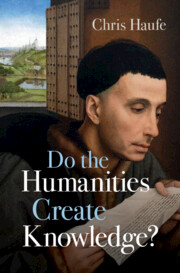Book contents
- Do the Humanities Create Knowledge?
- Do the Humanities Create Knowledge?
- Copyright page
- Dedication
- Epigraph
- Contents
- Preface
- Acknowledgments
- Chapter 1 Introduction
- Chapter 2 What Would the Community Think?
- Chapter 3 Canon and Consensus
- Chapter 4 Knowing What Matters
- Chapter 5 In Defense of How Things Seem
- Chapter 6 Reading What Lies Within
- Chapter 7 Humanities Victorious?
- Chapter 8 Of Interest
- Chapter 9 The Hoax and the Humanities
- Chapter 10 Conclusion
- References
- Index
Chapter 7 - Humanities Victorious?
Published online by Cambridge University Press: 10 November 2023
- Do the Humanities Create Knowledge?
- Do the Humanities Create Knowledge?
- Copyright page
- Dedication
- Epigraph
- Contents
- Preface
- Acknowledgments
- Chapter 1 Introduction
- Chapter 2 What Would the Community Think?
- Chapter 3 Canon and Consensus
- Chapter 4 Knowing What Matters
- Chapter 5 In Defense of How Things Seem
- Chapter 6 Reading What Lies Within
- Chapter 7 Humanities Victorious?
- Chapter 8 Of Interest
- Chapter 9 The Hoax and the Humanities
- Chapter 10 Conclusion
- References
- Index
Summary
Humanistic inquiry is not just about timeless questions and human experience. Viewed historically, it is equally about working within the constraints of a world of ideas shaped by a small set of exemplars. In this chapter I look at concrete instances of the use of canons in the history of the humanities. Different cultures designate different works as canonical. The point is not that everyone interested in the questions posed by the humanities should be reading the same works, but rather that humanistic inquiry in each community (however defined) must designate certain works as canonical in order to reap the scholarly benefits of a shared world.
- Type
- Chapter
- Information
- Do the Humanities Create Knowledge? , pp. 161 - 177Publisher: Cambridge University PressPrint publication year: 2023

